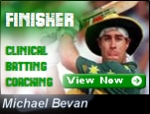|

Are you a cook or a chef?
I was asked exactly that at a recent symposium on talent identification. Weird?
A cook follows a recipe and ends up with a result that looks and tastes as intended.
A chef understands blends of flavour and textures. Chefs like Nigel Slater, Micheal Roux and Madhur Jaffrey balance a dish through experienced know-how by adding the right amount of "this", with a specific amount of "that" to end up with a taste sensation.
In the coaching world, 'cooks' read up on various coaching tools ranging from technical advice to biomechanics, psychological strategies, NLP and who know a bit about personality profiling. In fact, everyone on PitchVision Academy does this.
I congratulate you for investing time in your development as a coach.
The speaker would say that these types of coaches are excellent cooks: Capable of coming up with a good coaching result by following the sage advice picked up through reading and listening to experts across many fields.
Move from cook to chef
The speaker challenged us to be the "chef" instead.
Just as great chefs do, we can use all of our knowledge in an integrated and individual fashion dictated by the needs of the player, team and the conditions.
This balancing act requires experience, skill and patience. Three essential traits that both the worlds best coaches and Chef's possess.
So my questions to you are:
- How good are you at inviting other coaches and support staff into your coaching problems and challenges?
- How accepting are you of others challenging questions and critique when assessing your coaching style and interventions?
- How good are you at blending or integrating, S&C approaches with say, fast bowling technique, bowling craft (swing,seam, pace variation etc.) tactical skills within a flexible communication style?
If, like me, you think that there is one or more answers where you would like to be able to do that, yet you're not quite there yet, then keep up the good work and strive harder.
Turn yourself from a 'coaching cook' into a 'coaching chef'.
The last question
When was the last time you asked your players for feedback - positive and negative - about your coaching?
This is one of the most effective feedback tools when establishing if you are a cook or a chef in the coaching world.
I'm undertaking one this week.
4 players, 4 work colleagues in the coaching team and my boss all answer a questionnaire based on my coaching performance.
I have had 3 of these in my coaching career to date and they have given me the best feedback that I have ever had. Each time, this feedback has fuelled the next phase in my development for the immediate future.
I'm on my way to becoming a 'coaching chef'.
How about you?
Discuss this article with other subscribers
|

.jpg)




.jpg)


